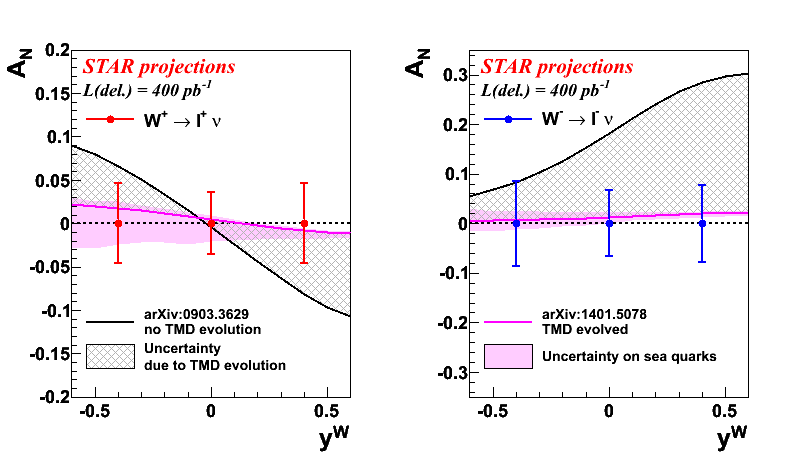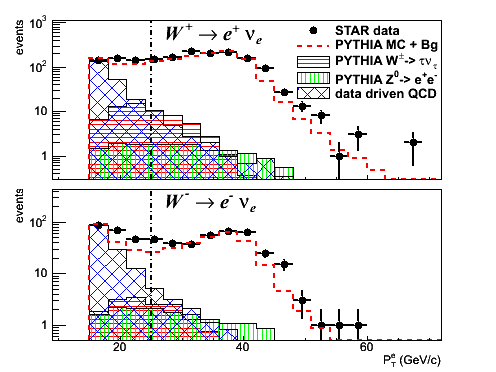Fully Reconstructed Ws
DIS 2014 Preliminary Results
DIS2014 preliminary plots
W 2011 AN
Vector boson asymmetry

Primary authors: Salvatore Fazio, Dmitri Smirnov, and Elke C. Aschenauer
When protons accelerated by RHIC collide at the Z and W bosons can be produced and their decay products measured at STAR. In this analysis we measure the asymmetry of the W (and Z) bosons produced in pp collisions with the spin of the protons perpendicular to the beam (transverse polarization). During the 2011 run STAR has collected such data for the first time. The bosons cannot be detected directly but their kinematics can be reconstructed by detecting the decay products. The Z bosons can be easily reconstructed in the di-electron channel. However, the reconstruction of the W's decaying into a eνe pair is challenging due to the undetected neutrino. The W has never before been reconstructed with the STAR detector. This analysis is the first attempt to reconstruct the kinematics of the W bosons at STAR.
The latest version of the analysis note is available from File:Vbasym.pdf
Technical Details
Getting the Code
The code for this analysis can be pulled from a CVS repository as:
cvs co -P -d WeakBosonTSSA offline/paper/psn0624
alternatively the code can be cecked from a github repository at https://github.com/plexoos/vbasym as:
$git clone git@github.com:plexoos/vbasym.git
The code heavily depends on the STAR libraries. It is verified to compile on the STAR cluster with the STAR environment. Before you can build and run the program, all the enviroment variables must be properly set. Please refer to the README file within the code's main directory or to the analysis note for more information on how to do it.
To compile the code one can do:
$cd vbasym $starver SL12c $cons $make stana $make vbana
The make command will produce standalone executables stana and vbana.
Running the Code
First one needs to reconstruct jets with stana as
$./stana -f filelist.lis -j
If the jet files are in the current directory one can run the analysis code as
$./stana -f filelist.lis
There is a job template available for running jobs on the farm. We use the following script to submit jobs
$./scripts/submit_jobs.sh
to check out transversely polarised pp2pp runs for the 2011 data taking year:
$get_file_list.pl -keys 'path,filename' -cond 'path!~long,filename~st_W,production=P11id,filetype=daq_reco_mudst,storage=hpss ' -limit 0 -delim '/'
Reading output files
The root file with the tree can be navigated after loading the appropriate libraries:
gROOT->LoadMacro("$STAR/StRoot/StMuDSTMaker/COMMON/macros/loadSharedLibraries.C");
loadSharedLibraries();
gSystem->Load(".sl53_gcc432/lib/libutils.so");
gSystem->Load(".sl53_gcc432/lib/libStVecBosAna.so");
TFile *_file0 = TFile::Open("R1210603X_test.Wtree.root")
Preliminary Results
Available at DIS 2014 preliminaries
2017 RHIC Projections
Available at 2017 projections plots
Paper proposal
Available at Paper Proposal page
Analysis Note
The current version of the analysis note is available here
Collection of latest results for the asymmetry
A collection of the latest results for the asymmetry including blue and yellow beam asymmetries extracted separately, asymmetries from the geometry and luminosity effects, asymmetries calculated from the decay lepton and all the sin(phi) modulations fits can be downloaded here
Results can also be easily accessed via a web interface at the following page:
http://www.star.bnl.gov/~fazio/vbasym/webview/
References
- Theoretical paper relevant for this analysis
- "Test the time-reversal modified universality of the Sivers function", http://arxiv.org/abs/0903.3629v1
- "Helicity Parton Distributions from Spin Asymmetries in W-Boson Production at RHIC", http://arxiv.org/pdf/1003.4533.pdf
- Two internal STAR notes on a similar W analysis
- "Longitudinal single-spin asymmetry A_L for W+ and W- production in polarized p+p collisions at \sqrt{s}=500~GeV, Run 9 data", http://drupal.star.bnl.gov/STAR/starnotes/private/psn0516
- "Measurement of the W and Z Production Cross Sections at Mid-rapidity in Proton-Proton Collisions at \sqrt{s} = 500 GeV in Run 9", http://drupal.star.bnl.gov/STAR/starnotes/private/psn0546
- Another paper from CDF on W reconstruction (CDF RunI data)
- "Measurement of the polar-angle distribution of leptons from W boson decay as a function of the W transverse momentum in p \bar{p} collisions at \sqrt{s}=1.8TeV"; PRD 70, 032004 (2004)
W Tranverse paper proposal
Measurement of the transverse single-spin asymmetry for weak boson production in polarized proton-proton collisions at RHIC
Target journal: Physical Review Letters
PAs: Salvatore Fazio, Dmitri Smirnov, and Elke-Caroline Aschenauer
Power Point presentation: HERE
abstract:
We present the measurement of the transverse single-spin asymmetry of weak boson production in transversely polarized proton-proton collisions at sqrt(s) = 500 GeV by the STAR experiment at RHIC. The measured observable is sensitive to the Sivers function, one of the transverse momentum dependent parton distribution functions, which is predicted to have the opposite sign in protonproton collisions from that observed in deep inelastic lepton-proton scattering. These data provide the first experimental investigation of the non-universality of the Sivers function, fundamental to our understanding of QCD.
TABELS OF RESULTS
PAPER JUSTIFICATION - for PRL editors
Figures
Figure 1
Figure 2
Figure 3
.png)
Transverse single spin asymmetry amplitude for W+-/Z0 boson production, the 3.4% overall systematic uncertainty due to beam polarization is not included
Figure 4
.png) Important conclusions for STAR members
Important conclusions for STAR members
Before the present work it was commonly believed that at the STAR detector, due to the limited tracker acceptance of pseudo-rapidity ∼ 1, the missing transverse momentum of the produced boson could not be reconstructed from the the hadronic recoil because particles with high rapidity escape the detector. This assumption did not account for the fact that proton remnants with high longitudinal momentum carry away only a little portion of the total transverse momentum.
The present analysis, based on a pilot run on 25 pb-1, is a proof-of-principle study which shows that the acceptance of the STAR detector is large enough to allow for a full reconstruction of W boson kinematics with Pt > 1 GeV. This was possible following a well known procedure previously used at Tevatron and the LHC. This method is two-fold: on a first step the boson Pt is reconstructed applying a Monte Carlo based correction to the data and on a second step the longitudinal component of the momentum is reconstructed solving the quadratic equation for the invariant mass of the produced boson.
The present STAR result is the world first measurement of the transverse single spin asymmetry for fully reconstructed weak bosons and will compete with Drell-Yan measurements for a first direct experimental test of color interactions in QCD based on measuring the universality breaking of the quark Sivers’ function in SIDIS and Drell-Yan (or weak boson production) process following from the fundamental prediction of gauge invariance in QCD. The verification of this universality breaking, the much discussed "Sivers' sign change", is acknowledged as an NSAC performance milestone for hadron physics.
STAR is the only experiment capable of measuring AN for direct photons, for W± and Z0 bosons, and possibly for DY, providing a world-wide unique opportunity to simultaneously test TMD evolution, access the Sivers function for sea quarks, and test the predicted sign-change for the Sivers function.
Paper conclusions
This measurement is based on a data set of transverse polarized p+p collisions at √s = 500 GeV with a recorded integrated luminosity of 25 pb−1. The results can lead to the first experimental test of the non-universality of the Sivers' function and provide a direct verification of the TMD evolution. Furthermore, it provides an ideal tool to study the spin-flavor structure of sea quarks inside the proton. The coupling of the W boson to the weak charge correlates directly to quark flavor. Ignoring quark mixing, W± bosons are produced through u+d-bar (d +u-bar) interactions. A measurement of the AN of weak bosons provides an ideal tool to study the spin-flavor structure of light quarks inside the proton, in an x-range where the measured asymmetry in the u-bar and d-bar unpolarized sea quark distribution can only be explained by strong non-pQCD contributions.
Recent presentations
Spin PWG, Aug 6th 2015 - (Study Report for the GPC)
STAR Collab. meeting, Nov. 4th 2014 (update)
Talk at DIS 2014 (first preliminary results)
Spin PWG, April 14th 2014 (request for preliminaries)
Spin PWG, Mar. 27th 2014 (update)
Spin PWG, Feb. 06th 2014 (analysis results presentation)
Analysis note (STAR Note PSN0624)
The current version of the analysis note is available here]
Support material and references
A brief description of the analysis code, other support and references can be found HERE
Tables of results
Tables of results can be found HERE
Paper drafts
Draft (V1.0) - first circulation to the Spin PWG
Draft (V3.0) - request for a GPC
Draft (V3.1) - first GPC revision
Draft (V4.0) - second GPC revision
Draft (V4.2) - third GPC revision
Draft (V5.1) - fourth GPC revision
Draft (V5.2) - fifth GPC revision
Draft (V5.3) - fifth GPC revision
Draft (V5.4) - sixth GPC revision
Draft (V5.5) - seventh GPC revision
Draft (V5.6) - eighth GPC revision
Draft (V5.7) - nineth GPC revision
Draft (V5.8) - first release to the STAR Collaboration
Draft (V6.1) - second release to the STAR Collaboration
Draft (V6.2) - third release to the STAR Collaboration
Draft (V6.3) - first submission to PRL
Draft (V6.7) - revisited version following comments from the referees
Draft (V7.0) - second submission to PRL









.png)